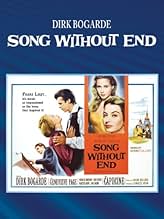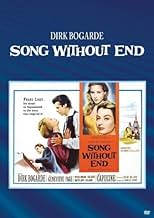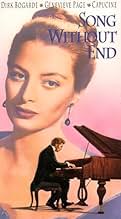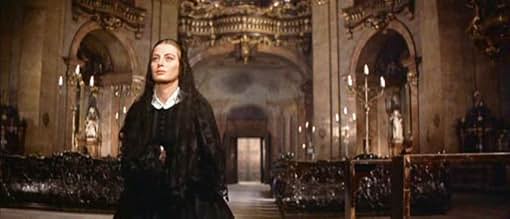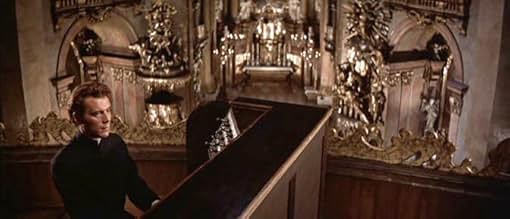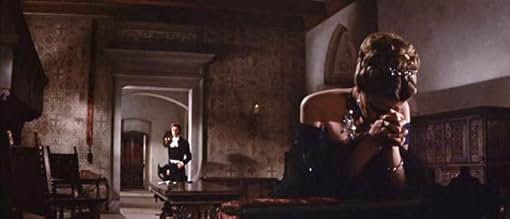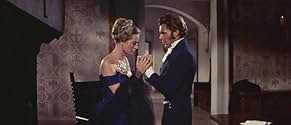The romantic story of Hungarian pianist Franz Liszt (Sir Dirk Bogarde), whose scandalous love affair forced him to abandon his adoring audiences.The romantic story of Hungarian pianist Franz Liszt (Sir Dirk Bogarde), whose scandalous love affair forced him to abandon his adoring audiences.The romantic story of Hungarian pianist Franz Liszt (Sir Dirk Bogarde), whose scandalous love affair forced him to abandon his adoring audiences.
- Directors
- Writers
- Stars
- Won 1 Oscar
- 2 wins & 3 nominations total
- Thalberg
- (as E. Erlandsen)
- Chopin
- (as Alex Davion)
- Emissary
- (scenes deleted)
- Audience Member
- (uncredited)
- Komparsenrolle
- (uncredited)
- Directors
- Writers
- All cast & crew
- Production, box office & more at IMDbPro
Featured reviews
I will always remember that performance of ' Les Prelues'as being the most powerful that I have ever heard even from the best symphony orchestras.The performances of the late Jorge Bolet are magnificent.Especially during the clever arrangement of the Concerto/Hungarian Fantasia. It is clear that Dirk Bogarde is not playing the piano,yet one cannot help but take pleasure in the greatness of the music whomever is playing.
The producer of the film also takes great pains in letting the audience know that Franz Liszt often performed the music of other composers like Wagner and Berlioz.He also was a great fan of Chopin. This is addressed in the film with care and intelligence.
I remember this film as a child and can still remember the great music.Thank God! for the score from Song Without End.
I thrilled to the bombast and impossible fingerwork of Hungarian Rhapsody No. 2. But the final piece Liszt (portrayed by Bogarde) played as he retreated to the monastery haunted me throughout my teenage years. Liebestraume No. 3 ("Dreams of Love") can either be a soothing balm or a cutting knife for the lovesick.
Bogarde, who obviously knew his onions about piano playing displayed the exact fingerwork on the proper fields of the keyboard and his body English was totally convincing. Well after all, he was not only an actor but a true artist - an accomplished writer and a painter.
Capuccine, touted as one of the most beautiful women at the time, portrayed the Princess of Witgenstein. But my heart fell for the jilted wife, the Belgian countess portrayed by Genevieve Page whom I found more,"simpatica."
I was expecting a comprehensive presentation of Liszt in a film devoted to his life and creative work. Less of interest were works by Bach, Beethoven, Mozart and others. The results looks like the film makers may have lacked complete confidence that a movie featuring compositions exclusively by Liszt would be that attractive to viewers.
In the event that's the case, it's no wonder the critical and public rating of this film is less than excellent. What's notable about it is the exquisite piano performance of Jorge Bolet on the soundtrack, the rich cinematography of James Wong Howe, and the flavorful performances by a talented cast headed by Dirk Bogarde.
A Liszt concert back then if played for a mass audience was something like the reception that Elvis and The Beatles got back in their day. It aroused the jealousy of a lot of Liszt's contemporaries, but they respected his talent.
Dirk Bogarde is a capable and charismatic Liszt who had a weakness for married women. He ran off with one and had a couple of kids by her and then seduces a royal countess. The two women in question are played by Genevieve Page and Capucine.
Dirk and Cappy have a whole lot of hurdles to overcome before they can be happy, put there by the Romanov family and the Catholic Church, but it does sort of work itself out in the end.
My favorite performance in the film is that of Martita Hunt who plays a dowager German princess who offers Liszt employment when he needs it.
The film only covers a small portion of Franz Liszt's life, still it's a worthwhile biographical study.
Did you know
- TriviaCharles Vidor had completed about 15 percent of this movie when he died of a heart attack on June 4, 1959. Sir Dirk Bogarde later recalled that he was "secretly relieved" by Vidor's death, since he and his co-star, Capucine had been treated badly by the short-tempered director. Vidor would often scream at Capucine to relax, and at one point, Bogarde recalled, "shook her like a dead cat." Vidor was replaced by George Cukor, who got along much better with his stars, and was more of an "actor's director."
- GoofsGrand Duchess make reference to "Ukraine" in one scene. The term was not in wide use in the 1840s, especially not among Russian nobility.
- Quotes
Countess Marie: I met Franz at a musical party. I remember he played a ballade in A-flat major by Chopin. I thought I'd never seen anything as beautiful as Franz looked when he sat at the piano. I... I wanted to cry. He watched me as he played; Franz never fails to notice a pretty woman in his audience. Afterward, he followed me into the hall. I remember he said, "May I escort you somewhere, madame?" And I said, "Yes." And he said, "Where?" And I said, "Paradise." He didn't smile - he said, "I'll call a carriage."
Princess Carolyne: Did he?
Countess Marie: What?
Princess Carolyne: Drive you there - to paradise?
Countess Marie: [a pause, and a meaningful look as she turns to leave the room] He doesn't know the road, madame.
- ConnectionsFeatured in Film Profile: Dirk Bogarde (1961)
- How long is Song Without End?Powered by Alexa
Details
- Runtime2 hours 21 minutes
- Aspect ratio
- 2.35 : 1
Contribute to this page



